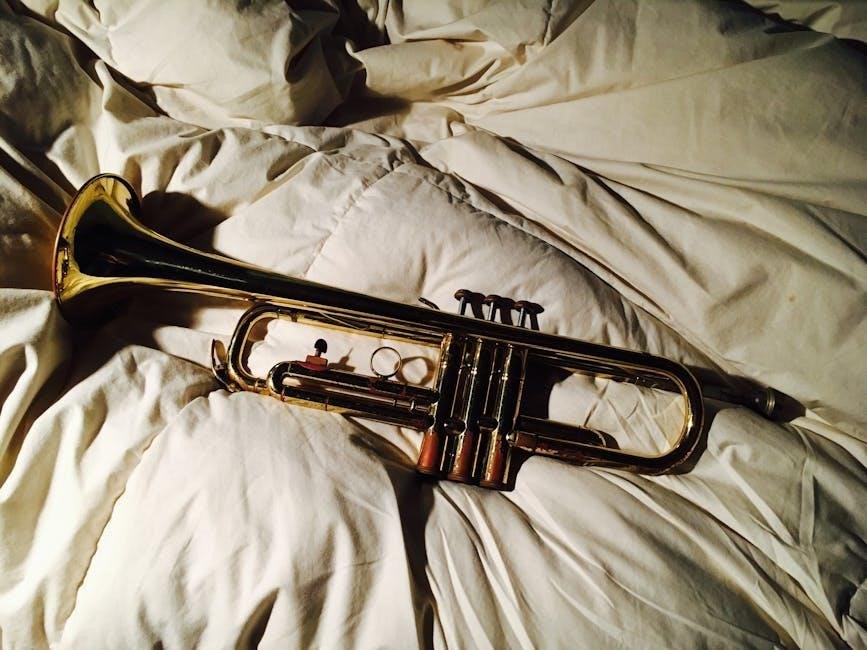
Clarke’s Technical Studies are renowned for their comprehensive approach to trumpet technique. Herbert L. Clarke, a celebrated cornetist and educator, crafted these studies to enhance fingering, range, and musicality. Available in PDF, they remain indispensable for trumpet players seeking to refine their skills and adapt to modern playing demands.
1.1 Overview of Herbert L. Clarke and His Contributions
Herbert L. Clarke was a renowned cornetist, educator, and composer, best known for his groundbreaking contributions to trumpet pedagogy. As a leading figure in the early 20th-century brass scene, Clarke served as a solo cornetist with the Sousa Band and later with the Victor Talking Machine Company. His method books, including Clarke’s Technical Studies and Elementary Studies for Trumpet, remain foundational for trumpet education. Clarke’s emphasis on proper technique, fingering, and musical expression revolutionized brass instruction, leaving a lasting legacy in the development of trumpet playing worldwide.
1;2 Importance of Technical Studies for Trumpet Players
Clarke’s Technical Studies are a cornerstone for trumpet players, offering a structured approach to developing technical and musical abilities. These exercises focus on improving fingering technique, expanding range, and building endurance. By systematically addressing these elements, players can achieve greater precision and control. The studies also emphasize musicality, helping trumpeters refine their expression and tone. As a result, Clarke’s works remain essential for both students and professionals, providing a foundation for mastery and adaptability in modern trumpet performance.

Structure and Content of Clarke’s Technical Studies

Clarke’s studies are systematically structured, progressing from basic to advanced exercises. They cover essential techniques like fingering, range expansion, and endurance, available in downloadable PDF format.
2.1 Breakdown of Exercises and Their Progression
Clarke’s Technical Studies are divided into exercises that gradually increase in complexity. The studies begin with fundamental techniques, such as finger dexterity and tone production, and progress to advanced challenges like range expansion and articulation. Each exercise builds upon the previous one, ensuring a logical and methodical approach to skill development. The progression is designed to strengthen technical proficiency while fostering musical expression. Available in PDF, these studies provide a clear framework for trumpet players to master essential skills systematically.
- Starts with basic finger exercises.
- Progresses to complex melodies and scales.
- Focuses on endurance and precision.
2.2 Key Techniques Covered in the Studies
Clarke’s Technical Studies emphasize essential techniques such as finger dexterity, range expansion, and articulation. The exercises focus on improving tone production, precision, and control. They also address chromatic scales, arpeggios, and complex melodies to enhance technical mastery. Additionally, the studies incorporate dynamics and phrasing, fostering musical expression. These techniques are foundational for trumpet players, providing a comprehensive approach to skill development. The PDF format allows easy access to these exercises, ensuring players can practice efficiently and refine their abilities systematically.
- Finger dexterity and accuracy.
- Range development and endurance.
- Articulation and phrasing.
2.3 Notable Studies and Their Significance
Clarke’s studies include notable exercises like Study No. 2, which focuses on expanding range and technical precision. These studies are designed to address specific challenges, such as chromatic scales, arpeggios, and complex melodies. Their significance lies in their ability to build foundational skills while fostering musical expression; Many exercises are adaptable to different skill levels, making them versatile for both beginners and advanced players. The structured progression ensures steady improvement in technical mastery and artistry.
- Study No. 2: Expanding range and technical precision.
- Chromatic exercises: Enhancing finger dexterity and accuracy.
- Complex melodies: Developing musicality and phrasing.
Benefits of Using Clarke’s Studies for Trumpet
Clarke’s studies enhance fingering technique, expand range and endurance, and refine musicality and expression. They provide a structured approach to mastering trumpet playing, benefiting players of all levels.
3.1 Development of Fingering Technique
Clarke’s studies are designed to systematically improve trumpet players’ fingering technique. The exercises focus on enhancing dexterity, accuracy, and coordination through carefully structured patterns. By practicing these studies, players develop consistency in finger placement and improve their ability to navigate complex passages. The progressive nature of the exercises ensures that both beginner and advanced players can benefit, with each study building on the previous one. This methodical approach helps trumpet players master challenging fingerings, arpeggios, and scales, ultimately refining their technical proficiency. The availability of these studies in PDF format makes them easily accessible for practice and review. Additionally, the exercises are adaptable for other wind instruments, such as the clarinet and cornet, further highlighting their versatility in musical education.
3.2 Improvement of Range and Endurance
Clarke’s studies are instrumental in expanding a trumpet player’s range and building endurance. The exercises are structured to gradually extend the player’s upper and lower registers through targeted arpeggios and scale patterns. By consistently practicing these studies, players develop the stamina needed for prolonged performances. The methodical progression of exercises ensures that both intermediate and advanced players can achieve significant improvements in range and control. This focus on endurance also enhances overall technical stability, allowing players to tackle demanding repertoire with confidence. The availability of these studies in PDF format ensures easy access for dedicated practice and mastery.
3.3 Enhancing Musicality and Expression
Clarke’s Technical Studies are not only technical exercises but also tools for fostering musicality. The studies emphasize phrasing, dynamics, and articulation, encouraging players to approach each piece with expressive intent. By mastering these elements, trumpet players can convey emotion and nuance in their performances. The structured progression of exercises helps develop a sense of timing and rhythm, essential for interpreting complex musical passages. Available in PDF, these studies provide a comprehensive method for integrating technical proficiency with artistic expression, making them invaluable for aspiring musicians seeking to refine their musical voice.

Application of Clarke’s Studies to Other Instruments
Clarke’s studies are versatile and beneficial beyond trumpet. Clarinet players and cornetists find them equally valuable for technical development. Adaptations also exist for other brass instruments, broadening their appeal.
4.1 Use of Clarke’s Studies for Clarinet Players
Clarke’s Technical Studies are highly adaptable for clarinet players, offering exercises that enhance finger dexterity and breath control. The structured progression of exercises mirrors those for trumpet, making them equally effective for wind instruments. Clarinetists benefit from the same technical challenges, improving articulation and precision. Additionally, the studies’ focus on musicality translates seamlessly, aiding in phrasing and expression. PDF versions of these studies are widely available, allowing clarinet players to access and practice these valuable exercises alongside trumpet enthusiasts, demonstrating their universal appeal and educational value across instrumental boundaries.
4.2 Adaptation for Cornet and Other Brass Instruments
Clarke’s Technical Studies were originally composed for the cornet, making them inherently suitable for brass instruments. The exercises are easily adaptable to other brass instruments, such as the trumpet, trombone, and French horn, due to their focus on technical proficiency and musicality. Players benefit from improved finger dexterity, breath control, and range expansion. The studies’ structured progression ensures a gradual mastery of complex passages, making them invaluable for brass instrumentalists. Additionally, the availability of Clarke’s studies in PDF format has facilitated their widespread use across various brass ensembles and educational programs, ensuring their continued relevance and application.
Historical Context and Legacy
Herbert L. Clarke’s Technical Studies, first published in 1909, revolutionized trumpet education. Clarke, a renowned cornetist, aimed to standardize and refine technical proficiency, leaving a lasting legacy in brass pedagogy. His work remains a cornerstone of trumpet studies, influencing generations of players and educators. The studies’ enduring relevance underscores Clarke’s contributions to the evolution of trumpet technique and musical expression.
5.1 Herbert L. Clarke’s Influence on Trumpet Education
Herbert L. Clarke’s Technical Studies significantly shaped trumpet education, establishing foundational exercises for technical mastery. His method, first published in 1909, emphasized precise fingering, range extension, and musicality. Clarke’s approach standardized trumpet pedagogy, making his studies essential for learners. The integration of his works into modern curricula highlights their lasting impact. Clarke’s legacy continues to inspire educators and players, ensuring his studies remain central to trumpet training and artistic development, bridging tradition with contemporary practice through their timeless relevance and adaptability.
5.2 Evolution of Technical Studies in Trumpet Pedagogy
Technical studies in trumpet pedagogy have evolved significantly since Clarke’s foundational work. His exercises laid the groundwork for modern methods, blending traditional techniques with innovative approaches. Today, educators incorporate technology, diverse musical styles, and adaptability to suit contemporary learning needs. Clarke’s studies, while unchanged, are often supplemented with audio resources and MIDI files for enhanced practice. This evolution ensures that technical training remains relevant, catering to the demands of modern trumpet performance while preserving the timeless principles established by Clarke.
Resources and Availability
Clarke’s Technical Studies are widely available in PDF format, along with MIDI files and audio resources, ensuring accessibility for modern trumpet players. Visit TrumpetStudio.com for comprehensive materials.
6.1 Downloading Clarke’s Studies in PDF Format
Clarke’s Technical Studies are readily available for download in PDF format, making them accessible to trumpet enthusiasts worldwide. Websites like TrumpetStudio.com offer free downloads, ensuring easy access to these invaluable resources. Additionally, supplementary materials such as MIDI files and audio recordings accompany the PDF versions, providing a comprehensive learning experience. These resources are designed to support trumpet education and practice, catering to both beginner and advanced players. The availability of Clarke’s studies in digital formats ensures their continued relevance and accessibility in modern trumpet pedagogy.
6.2 Supplementary Materials and Audio Resources
Supplementary materials, such as MIDI files and audio recordings, complement Clarke’s Technical Studies, offering a richer learning experience. These resources, available on platforms like TrumpetStudio.com, provide auditory guidance, helping players refine their technique and interpretation. Audio recordings allow trumpet players to hear professional renditions of the studies, aiding in developing tone and phrasing. Additionally, MIDI files enable players to practice alongside accompaniments, enhancing rhythmic accuracy and musicality. These tools cater to both beginner and advanced players, ensuring a well-rounded approach to mastering Clarke’s exercises and adapting them to modern performance standards.

Modern Relevance and Usage
Clarke’s studies remain integral to modern trumpet education, offering timeless technical and musical challenges. Adaptations and digital resources, like downloadable PDFs and audio guides, enhance accessibility for contemporary players.
7.1 Integration into Contemporary Trumpet Curricula
Clarke’s Technical Studies are seamlessly integrated into modern trumpet curricula, serving as foundational material for technical development. Many educational institutions incorporate these studies into their syllabi, recognizing their enduring relevance. Digital platforms offer PDF versions and supplementary audio resources, making them accessible to a new generation of players. These resources align with contemporary teaching methods, ensuring that Clarke’s work remains a cornerstone of trumpet education. The studies’ structured progression and focus on essential techniques continue to benefit students and professionals alike in today’s musical landscape.
7.2 Adaptations and Arrangements for Modern Players
Clarke’s studies have been adapted to meet the needs of modern trumpet players, with arrangements for B trumpet and other brass instruments. Digital formats, including downloadable PDF versions, enhance accessibility. Supplementary materials like MIDI files and audio recordings provide players with tools to practice effectively. These adaptations ensure that Clarke’s work remains relevant, offering a bridge between traditional techniques and contemporary performance practices. The studies’ versatility allows them to be integrated into various instructional contexts, catering to diverse learning styles and technological advancements in music education.
Clarke’s studies remain a cornerstone of trumpet education, offering unparalleled technical mastery and musical expression; Their timeless relevance ensures they continue to inspire and challenge players worldwide.
8.1 Summary of the Value of Clarke’s Studies
Clarke’s Technical Studies are a cornerstone of trumpet education, providing foundational exercises for technical mastery, musicality, and adaptability. Their structured progression enhances fingering, range, and endurance, while their availability in PDF and supplementary materials ensures accessibility for modern players. Widely used by trumpet, clarinet, and cornet players, these studies remain essential for developing proficiency and expression. Their enduring relevance underscores Clarke’s lasting impact on brass pedagogy, making them a timeless resource for aspiring musicians worldwide.
8.2 Final Thoughts on Their Continued Importance
Clarke’s Technical Studies remain indispensable in modern trumpet education, offering timeless exercises adaptable to contemporary techniques. Their availability in PDF and integration into curricula ensure accessibility for today’s players. The studies’ versatility extends to clarinet and cornet, while supplementary materials like audio resources enhance learning. Clarke’s influence on trumpet pedagogy is unparalleled, with his exercises, such as range-expanding studies, still widely used. Their enduring relevance and adaptability secure their place as essential tools for musicians striving for technical mastery and artistic expression;